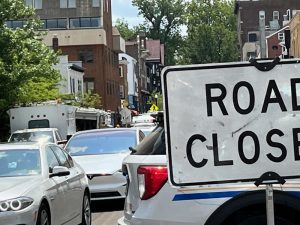 If those words run have through your mind or come out of your mouth as you’re driving or trying to park somewhere around Princeton, you are not alone! Congestion, construction and parking difficulties seem to be commonplace while Princeton is trying to enhance itself in various ways. From the closures or construction along and nearby Witherspoon Street, to the demolition of the Tennent-Roberts-Whiteley buildings along Stockton Street, the creation of The Graduate Hotel on Chambers at Nassau Streets, Triumph Brewery construction in Palmer Square, PSE&G gas main replacements around town, apartment complex creations and Walgreens construction underway on either side of Princeton Shopping Center and down the road at the Thanet site, just to name some. Road crews, large machinery, necessary road closures and more are all being done with the hopes of creating better opportunities to live, shop and visit Princeton. But as they’re taking place, they are making many want to run for the hills!
If those words run have through your mind or come out of your mouth as you’re driving or trying to park somewhere around Princeton, you are not alone! Congestion, construction and parking difficulties seem to be commonplace while Princeton is trying to enhance itself in various ways. From the closures or construction along and nearby Witherspoon Street, to the demolition of the Tennent-Roberts-Whiteley buildings along Stockton Street, the creation of The Graduate Hotel on Chambers at Nassau Streets, Triumph Brewery construction in Palmer Square, PSE&G gas main replacements around town, apartment complex creations and Walgreens construction underway on either side of Princeton Shopping Center and down the road at the Thanet site, just to name some. Road crews, large machinery, necessary road closures and more are all being done with the hopes of creating better opportunities to live, shop and visit Princeton. But as they’re taking place, they are making many want to run for the hills!
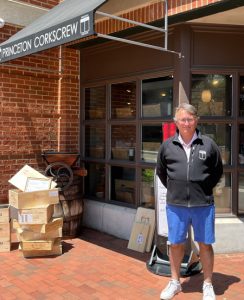 “All of this construction over the past 18 months was very underestimated,” shares Laurent Chapius, who owns and has operated Princeton Corkscrew for 27 years. Located on Hulfish near Chambers, the retailer was hit hard from COVID and has not seen his regular brick and mortar business return in the same way since. He says on-and-off street closures, without enough advanced communication, have made in-store events too difficult to coordinate and walk-in traffic has nearly disappeared. “Sometimes I come to my street and the area is entirely closed. No customers can come in, it’s impossible.”
“All of this construction over the past 18 months was very underestimated,” shares Laurent Chapius, who owns and has operated Princeton Corkscrew for 27 years. Located on Hulfish near Chambers, the retailer was hit hard from COVID and has not seen his regular brick and mortar business return in the same way since. He says on-and-off street closures, without enough advanced communication, have made in-store events too difficult to coordinate and walk-in traffic has nearly disappeared. “Sometimes I come to my street and the area is entirely closed. No customers can come in, it’s impossible.”
HOW CONSTRUCTION PLANS ARE CONSTRUCTED
When authorizing permits for Princeton projects, the municipality says it take a holistic approach, doing its best to ensure minimal disruption to the lives of locals, visitors and business owners. But, even with their best efforts, hosting weekly or sometimes daily coordination meetings bringing all major project heads together, there are glitches.
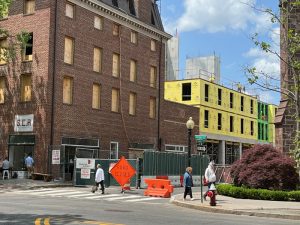 “Deanna [Stockton, Deputy Administrator/Municipal Engineer] and I were driving back from a meeting at the University one day. It was the day we authorized the Graduate Princeton hotel to close Chambers Street, that was the only authorized closure. We went past Palmer Square and Witherspoon was closed, we tried to turn down elsewhere and multiple other streets were closed,” recalls Assistant Municipal Engineer Jim Purcell. “I immediately called everyone and said, ‘What are you doing?’ They told me they had a sudden crew available, and I explained they can’t just do that. We made them shut down their work because they weren’t authorized.”
“Deanna [Stockton, Deputy Administrator/Municipal Engineer] and I were driving back from a meeting at the University one day. It was the day we authorized the Graduate Princeton hotel to close Chambers Street, that was the only authorized closure. We went past Palmer Square and Witherspoon was closed, we tried to turn down elsewhere and multiple other streets were closed,” recalls Assistant Municipal Engineer Jim Purcell. “I immediately called everyone and said, ‘What are you doing?’ They told me they had a sudden crew available, and I explained they can’t just do that. We made them shut down their work because they weren’t authorized.”
Even if everybody worked according to plan, having so many large projects going on within a town that’s little more than 18-square miles will cause disruptions. Within the center of town, the local businesses are being hit the hardest. With Nixle alerts, website updates, details included in the weekly municipal newsletter and sometimes going door-to-door to inform residents/businesses, Princeton officials have been working hard to keep everyone informed. But not all local residents pay attention and out-of-town visitors show up who have little to no knowledge of what’s happening. For businesses, even the alerts that come out of the weekly meetings are often too late or not informative enough to help them plan events or truck shipments and deliveries.
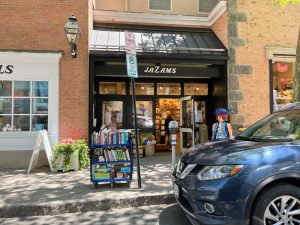 “They tell us, but not enough ahead of time to plan. We’re just doing what we do really well and hoping there’s an end. We’re not doing events [like Block Party] because those are impossible right now,” says Joanne Farrugia, co-owner of jaZams on Palmer Square East. “Communication is the key and none of the signs have dates. Customers are continually thinking it’s just a moment in time, but if there were dates on the signs they could plan. We are disappointing them every day.”
“They tell us, but not enough ahead of time to plan. We’re just doing what we do really well and hoping there’s an end. We’re not doing events [like Block Party] because those are impossible right now,” says Joanne Farrugia, co-owner of jaZams on Palmer Square East. “Communication is the key and none of the signs have dates. Customers are continually thinking it’s just a moment in time, but if there were dates on the signs they could plan. We are disappointing them every day.”
OPPORTUNITIES TO MITIGATE THE PROBLEMS
It’s a lot all at once, seems to be the mantra from the downtown store owners, all of whom are in favor of progress and enhancing the beauty and ultimate walkability of the town, but wish it wasn’t happening in this way.
“I sympathize and I feel really bad about loss of business,” Purcell says. “When you’re in the middle of the chaos, it is hard to remember that what is being done is what you asked for. You need to blame someone else, but everyone wanted a more pedestrian friendly environment in the central business district.”
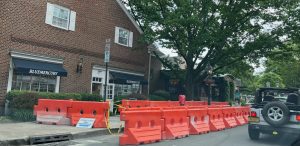 Walkability, beautification and the building of the Graduate Princeton and new Triumph Brewing Co. location will likely end up helping retail stores, but owners like Chapius and Farrugia say it wasn’t something they and many other local merchants felt was necessary, at least right now. They wonder who was pushing for it?
Walkability, beautification and the building of the Graduate Princeton and new Triumph Brewing Co. location will likely end up helping retail stores, but owners like Chapius and Farrugia say it wasn’t something they and many other local merchants felt was necessary, at least right now. They wonder who was pushing for it?
“Priorities appear to be given too much to restaurants and not traditional retail,” Chapius expresses. “I can fight competitors. I can fight the economy. But this is beyond what I can fight against.” In addition to the walk-in customer, his business relies on the ability for vehicles to park nearby to pick up cases of wines for catering and events. He doesn’t have the type of business that can utilize expanded sidewalk space such as restaurants with outdoor dining.
Experience Princeton, created last year upon the approval of a Special Interest District in Princeton, is here to work for local merchants. Its mission is to “shape, maintain and grow a flourishing Princeton economy by offering an exceptional experience for residents and visitors; and advocate for a robust and diverse business community through strong partnerships.” Chapius says he doesn’t feel like anyone is fighting on behalf of businesses like his but Experience Princeton’s Executive Director, Isaac Kremer, says they have often brought forth merchant’s issues regarding the construction to the municipality, and found them very receptive.
“We will continue to brainstorm solutions, make recommendations, and support implementation. Some responses will be short term and have immediate impact. Others will be medium or long term but just as important to pursue,” shares Kremer. While construction, traffic and parking have definitely impacted area businesses, he says high levels of visitation are returning while he and his team work to mitigate problems and assist with referrals for things that pop up. “Whether it be better wayfinding signage, advocating for traffic remedies, or providing sound professional guidance to the town, our organization will continue to pursue what is in the best interest of businesses and everyone who visits, works, shops, and dines in Princeton.”
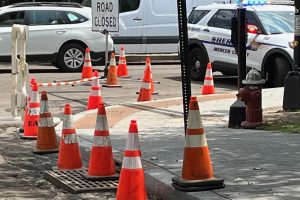 Dorothea von Moltke, co-owner of Labyrinth Books, was in meetings about Witherspoon redevelopment with other locals, merchants and municipal representatives since its earliest stages. She stressed then, and still feels, that the timing of this specific project would further harm local small business owners who were already suffering from pandemic fallout.
Dorothea von Moltke, co-owner of Labyrinth Books, was in meetings about Witherspoon redevelopment with other locals, merchants and municipal representatives since its earliest stages. She stressed then, and still feels, that the timing of this specific project would further harm local small business owners who were already suffering from pandemic fallout.
“This planning happened towards the end of the most intense phase of the pandemic: this was a time when the general imaginary of potential traffic impacts was shaped by a situation of artificially diminished overall traffic as well as less than average pressure on the availability of parking spaces. Along with other merchants, I was advocating for putting the state funds that were available and needed to be used for Witherspoon Street to work first on the stretch of Witherspoon North of the Arts Council, an area arguably in greater need of vitalization. This would have allowed the planning for the other stretch of Witherspoon to have happened in full view of pressures and needs under more normalized conditions,” shares von Moltke. “Let’s make sure that when the construction crews leave, we haven’t lost overall parking options and that it will be reasonably easy to get where you’re going. If not, the fallout for local businesses will continue to be dramatic.”
MORE FALLOUT
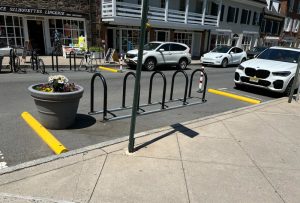 Phase 1 of the Witherspoon Street Improvement Project is nearly complete, with just some final punchlist items to be finished. Phase 2, on Witherspoon from Green St. to Leigh Ave., is now underway and started with sanitary sewer replacement. Through it all, some of the downtown parking meters have been removed, temporarily or permanently, others have been changed from 3-hour to 30-minutes. Bike racks have also been put in, eliminating even more spots. In addition, with full or partial road closures, there are frequent difficulties getting from one area that might have parking to another.
Phase 1 of the Witherspoon Street Improvement Project is nearly complete, with just some final punchlist items to be finished. Phase 2, on Witherspoon from Green St. to Leigh Ave., is now underway and started with sanitary sewer replacement. Through it all, some of the downtown parking meters have been removed, temporarily or permanently, others have been changed from 3-hour to 30-minutes. Bike racks have also been put in, eliminating even more spots. In addition, with full or partial road closures, there are frequent difficulties getting from one area that might have parking to another.
The municipality says Spring Street Garage is a viable option, offering the first hour free (through July, then it will revert back to the first 30-minutes free) and there’s always room at Chambers Street Garage, but those spaces have been underutilized.
“Clients complain they drive in circles. They get frustrated and then leave,” Palmer Square East’s Highbar Boutique owner Jill Wargo reveals. “We offer one-hour free parking at Chambers Street Garage for clients who make a purchase, hoping to help them develop the habit of choosing the garage. People are rethinking their trips to Princeton, if we could get the message out to go into a lot, it would help.”
At nearby Olsson’s Fine Foods and Cheese, employees say parking decks aren’t all they’re cracked up to be, citing it is tough to find spots even in the Chambers Street garage if you arrive after 11am. If you choose the Spring Street Garage, be aware that availability is going to get even tighter. Concrete repairs are about to start there, which are expected to eliminate approximately 100 spots at a time over the next six to nine months.
“Truck drivers are getting honked and sworn at,” explains Olsson’s owner, Rudie Smit, as delivery trucks are now getting in the way of through traffic or blocking open parking spots. “This is the worst I’ve seen it. People come in and say they’ve come today but might not be coming back. At a certain moment, you just stop trying to park.”
TRAFFIC, TRAFFIC EVERYWHERE
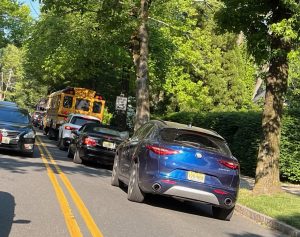 Beyond the shopping areas, locals are also encountering slowdowns driving in more residential areas. On trash day, traffic can be backed up for blocks. On the northeast side of town, multiple projects are creating disruptions such as the Walgreens construction at the Princeton Shopping Center along with new residential apartment complexes nearby and at the Thanet property. What will traffic be like once those bring in hundreds of new residents?
Beyond the shopping areas, locals are also encountering slowdowns driving in more residential areas. On trash day, traffic can be backed up for blocks. On the northeast side of town, multiple projects are creating disruptions such as the Walgreens construction at the Princeton Shopping Center along with new residential apartment complexes nearby and at the Thanet property. What will traffic be like once those bring in hundreds of new residents?
“According to traffic engineers, who did all the analysis for that before planning board approval, there is minimal impact for the infrastructure. The new housing is where it is because it’s close to a transit hub. Princeton Shopping Center is a transit hub (605 route includes it), our own free municipal bus route includes the shopping center, and Tiger Transit,” Purcell details. “We’re making improvements to Terhune Road to make it more walkable. All of that housing is in a location we’re hoping people can live, work, shop and get to other places without getting in a motor vehicle.”
In addition, Princeton is hoping to prevent further traffic and ease what has developed by creating safer avenues for people to walk or bike. Near the shopping center, biking areas are expected to be added through a separate frontage along The Alice development and on Terhune, with a bike lane added. When Phase 3 of the Witherspoon project is done, down near Community Park School, a raised crosswalk is going to be added at Henry Ave. and Guyot and on the school side, an 8-ft. wide sidewalk is going to be added, so it can be a shared use lane.
THERE IS MORE TO COME
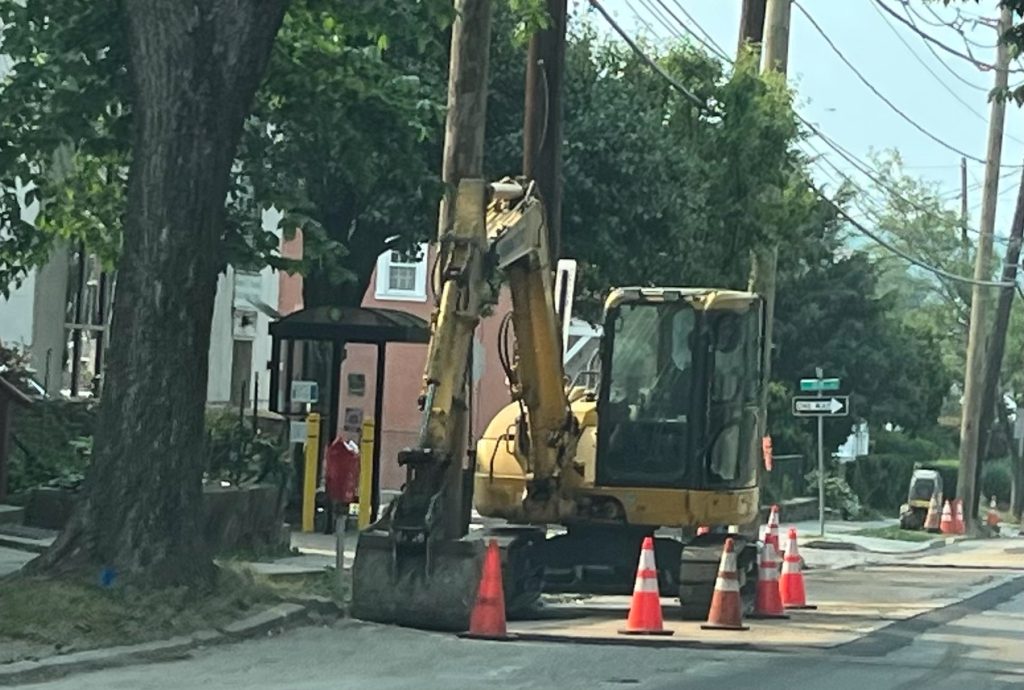 If you are looking ahead for the calm, look with caution as years of new projects are already in the books. With 3 phases overall, the Witherspoon Street reconstruction down to Valley Road is not expected for completion until 2025.
If you are looking ahead for the calm, look with caution as years of new projects are already in the books. With 3 phases overall, the Witherspoon Street reconstruction down to Valley Road is not expected for completion until 2025.
Affordable housing overlays, which essentially provide incentives for builders to add affordable housing while they develop certain areas, have led to a lot of submissions of concept designs or development plans.
“A lot of developers are looking to densify housing on properties like in Jugtown at Nassau at Harrison, at Charlton and Nassau, and along the Witherspoon St. corridor,” explains Purcell. “On Witherspoon just south of Franklin there will be 4 new housing units behind Hiltons clothing store. There are plans for more housing units behind Delizioso Bakery + Kitchen and there are plans for redeveloping the other side of Witherspoon with multiple units and affordable housing.”
If you wander onto or near Princeton University’s campus, there are numerous construction projects that have received approvals or already taking place.
“The projects already underway on the Princeton campus and in West Windsor will continue for several more years as these are complex projects that take time to construct. Schmidt Hall, to be located along Washington Road at the site of the current Guyot Hall, was recently approved by the Princeton Planning Board but is not yet under construction. Additionally, the University undertakes projects throughout the year to do major maintenance work on existing campus buildings, and this activity accelerates in the summer months,” explains Michael Hotchkiss, Assistant Vice President for Communications at Princeton University. “Construction can be disruptive, and the University’s capital projects management team makes every effort to minimize disruption.”
Elsewhere around Princeton, there are resurfacing and paving projects, such as on Province Line Road. There is also ongoing utility work with PSE&G replacing 12-miles of gas main throughout 2023. Underground, there is planned sewer work, as the municipality is upgrading the system. New sewers are to be constructed in Laurel Circle off Mt. Lucas very soon and the Hamilton Avenue replacement project as well.
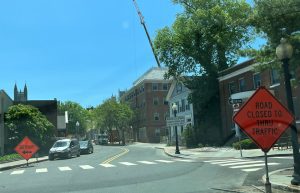 The Graduate hotel is expected to open in spring 2024, which would conclude any planned work on Chambers Street. And for the time being, Palmer Square Management says they have paused plans for the Griggs lot project (at Witherspoon and Hulfish). Building permits were never pulled and approvals for it have expired, though they expect to resume planning discussions for the space next year.
The Graduate hotel is expected to open in spring 2024, which would conclude any planned work on Chambers Street. And for the time being, Palmer Square Management says they have paused plans for the Griggs lot project (at Witherspoon and Hulfish). Building permits were never pulled and approvals for it have expired, though they expect to resume planning discussions for the space next year.
It costs money to make money, and there are benefit of the construction, but for businesses like Princeton Corkscrew, situated not just near Witherspoon and Palmer Square construction but also at Chambers Street and nearby John Street (which is expected to be a site of work), he wishes there were more help from the town.
“Couldn’t the city help retailers financially by cutting some of the taxes and fees?” Chapius asks, as he shows me a license renewal quoted in the thousands. “They could help us and cut some of the fees, because we’re suffering.”
There are ups and downs for business owners, and the municipality is aware that the construction is impacting everyone.
“There is a constant effort to balance the need for infrastructure/road work/closings and the ability for people and traffic to get where they want to go,” responds Mayor Mark Freda. “But we cannot selectively reduce taxes or fees. We have stepped up our communications efforts to keep people informed about what is happening; and we solicit feedback and suggestions continuously.”
Should you want to share your thoughts with the municipality, you can share them via this this online form.
KEEPING TRACK
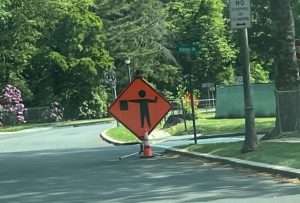 In the meantime, if you want help to try to mitigate their impact and be informed of where and when projects are taking place, you can do the following:
In the meantime, if you want help to try to mitigate their impact and be informed of where and when projects are taking place, you can do the following:
- Sign up for Nixle alerts by texting your zip code to 888777. These are sent out by Princeton Police to inform about road closures, emergencies, etc.
- The Witherspoon Street Construction newsletter can be sent right to your inbox by signing up here.
- The latest details available for other sites such as the Tennent-Robert-Whiteley development and affordable housing projects can be found on the municipal website here.
- Active campus detours around Princeton University’s campus can be found on their construction website here.
Lisa Jacknow spent years working in national and local news in and around New York City before moving to Princeton. Working as both a TV producer and news reporter, Lisa came to this area to focus on the local news of Mercer County at WZBN-TV. In recent years, she got immersed in the Princeton community by serving leadership roles at local schools in addition to volunteering for other local non-profits. In her free time, Lisa loves to spend time with her family, play tennis, sing and play the piano. A graduate of the S. I. Newhouse School of Public Communications at Syracuse University, Lisa was raised just north of Boston, Massachusetts but has lived in the tri-state area since college. She is excited to be Editor and head writer for Princeton Perspectives!


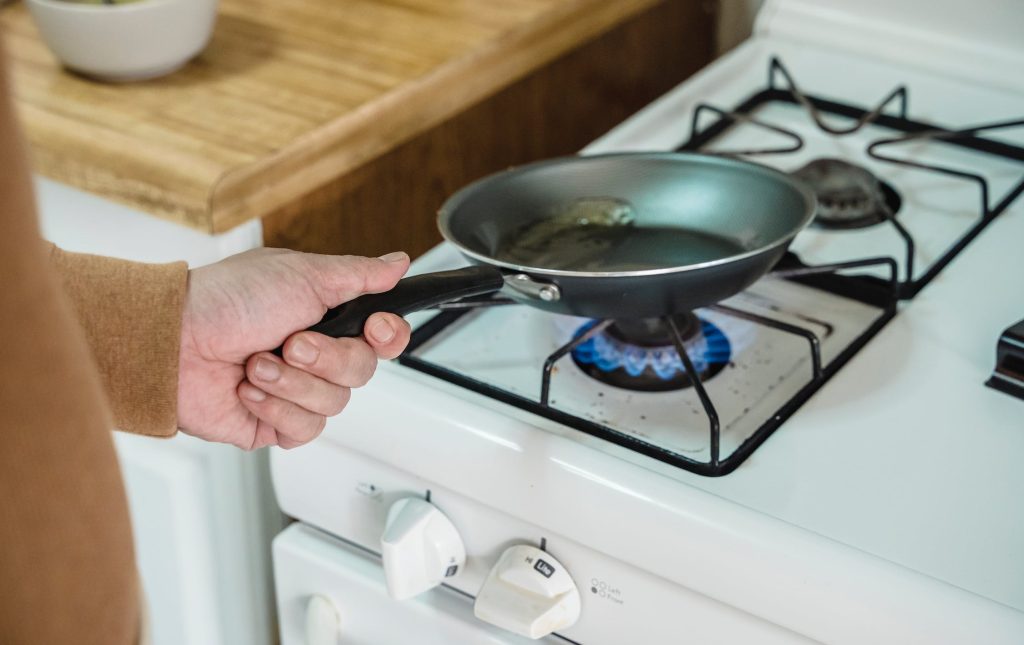 New Jersey Governor Phil Murphy wants to move away from fossil fuels. To move forward in this effort, the New Jersey Board of Public Utilities (BPU) voted last month to ask utility companies in NJ to offer incentives for customers that make the switch from gas stoves. People quickly assumed that meant homeowners would be forced to replace their existing ones, and pizza parlors would have to get new ovens as well, but both were quickly dismissed as rumors. The reality is that the BPU vote hopes to encourage many to change their ranges to electric, but not require them to.
New Jersey Governor Phil Murphy wants to move away from fossil fuels. To move forward in this effort, the New Jersey Board of Public Utilities (BPU) voted last month to ask utility companies in NJ to offer incentives for customers that make the switch from gas stoves. People quickly assumed that meant homeowners would be forced to replace their existing ones, and pizza parlors would have to get new ovens as well, but both were quickly dismissed as rumors. The reality is that the BPU vote hopes to encourage many to change their ranges to electric, but not require them to.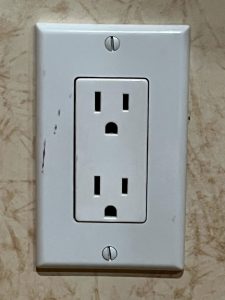 Let’s start with your home energy supply. Most people do not realize that you can have a say in where it comes from and help control your own costs. The actual lines, pipes and other equipment that bring energy into the majority of homes in Mercer County are owned and controlled by Public Service Enterprise Group (PSE&G) and Jersey Central Power & Light (JCP&L). For most, they are the supplier of the electric power and natural gas as well, but simply because they are the distributor no longer means they have to provide the energy to you. New Jersey law allows for owners to decide whom they want their energy supply to come from to allow for more open competition.
Let’s start with your home energy supply. Most people do not realize that you can have a say in where it comes from and help control your own costs. The actual lines, pipes and other equipment that bring energy into the majority of homes in Mercer County are owned and controlled by Public Service Enterprise Group (PSE&G) and Jersey Central Power & Light (JCP&L). For most, they are the supplier of the electric power and natural gas as well, but simply because they are the distributor no longer means they have to provide the energy to you. New Jersey law allows for owners to decide whom they want their energy supply to come from to allow for more open competition. Between pricing and options, there’s a lot to consider. If you prefer to start simpler, there are ways that you can conserve energy by delving into how you utilize your energy instead of where your it comes from. Home energy assessments, which bring a certified energy expert into your home to educate you on product options and provide simple product changes, could cost you nothing. Yet they could bring great rewards to both your pocketbook and the environment. The advice could be as simple as turning down your thermostat when you leave or switching your bulbs to LED, which use 90% less electricity than older incandescent bulbs. Replacing your existing showerhead with a low-flow option could save you 25-60% on water, according to the U.S. Department of Energy.
Between pricing and options, there’s a lot to consider. If you prefer to start simpler, there are ways that you can conserve energy by delving into how you utilize your energy instead of where your it comes from. Home energy assessments, which bring a certified energy expert into your home to educate you on product options and provide simple product changes, could cost you nothing. Yet they could bring great rewards to both your pocketbook and the environment. The advice could be as simple as turning down your thermostat when you leave or switching your bulbs to LED, which use 90% less electricity than older incandescent bulbs. Replacing your existing showerhead with a low-flow option could save you 25-60% on water, according to the U.S. Department of Energy. If you want to change just one thing, and choose to get a new appliance, you will immediately make a positive impact on the environment and your monthly bills. In 2023, there are very few appliances sold new that are not ENERGY STAR® certified. You have likely seen the logo on appliances you own or in the store. It symbolizes that the U.S. Environmental Protection Agency (EPA) has partnered with the manufacturer to ensure the appliance is more energy efficient.
If you want to change just one thing, and choose to get a new appliance, you will immediately make a positive impact on the environment and your monthly bills. In 2023, there are very few appliances sold new that are not ENERGY STAR® certified. You have likely seen the logo on appliances you own or in the store. It symbolizes that the U.S. Environmental Protection Agency (EPA) has partnered with the manufacturer to ensure the appliance is more energy efficient. -Conserve water. Energy is used to pump and treat the water you use, so simply turning off the water when you brush your teeth or getting your leaky faucet fixed promptly can reduce pollution and save you money. A leak of one drip every second can cost you up to $35 per year.
-Conserve water. Energy is used to pump and treat the water you use, so simply turning off the water when you brush your teeth or getting your leaky faucet fixed promptly can reduce pollution and save you money. A leak of one drip every second can cost you up to $35 per year. This year in New Jersey, there are nearly 10 electric vehicles per every 1,000 residents. The first mass-produced hybrid vehicle, the Toyota Prius, first sparked people’s interest in a more environmentally friendly car when it came onto the U.S. market in 2001. Since then, peoples’ desires, government regulations and manufacturing opportunities have enabled a growing market. In 2020, New Jersey Governor Phil Murphy signed legislation he hoped would help to reduce emissions in the Garden State, with a goal of having 330,000 electric vehicles (EVs) registered to New Jerseyans by 2025. We wrote about the state’s new climate goals in the article
This year in New Jersey, there are nearly 10 electric vehicles per every 1,000 residents. The first mass-produced hybrid vehicle, the Toyota Prius, first sparked people’s interest in a more environmentally friendly car when it came onto the U.S. market in 2001. Since then, peoples’ desires, government regulations and manufacturing opportunities have enabled a growing market. In 2020, New Jersey Governor Phil Murphy signed legislation he hoped would help to reduce emissions in the Garden State, with a goal of having 330,000 electric vehicles (EVs) registered to New Jerseyans by 2025. We wrote about the state’s new climate goals in the article  The Township of Robbinsville and The College of New Jersey both took advantage of incentives to transition part of their fleets to EV, and multi-family complexes in Princeton, Lawrence, East Windsor, West Windsor and Robbinsville have used state incentives to install Level-2 charging stations for residents and guests. But a true switch to all-electric vehicles requires everyone to want and be able to do so.
The Township of Robbinsville and The College of New Jersey both took advantage of incentives to transition part of their fleets to EV, and multi-family complexes in Princeton, Lawrence, East Windsor, West Windsor and Robbinsville have used state incentives to install Level-2 charging stations for residents and guests. But a true switch to all-electric vehicles requires everyone to want and be able to do so. July data shows that Tesla sales make up approximately 60% of the U.S. market. The other 40% are comprised of 20+ car brands including Polestar, Mercedes Benz, Audi, and Genesis.
July data shows that Tesla sales make up approximately 60% of the U.S. market. The other 40% are comprised of 20+ car brands including Polestar, Mercedes Benz, Audi, and Genesis.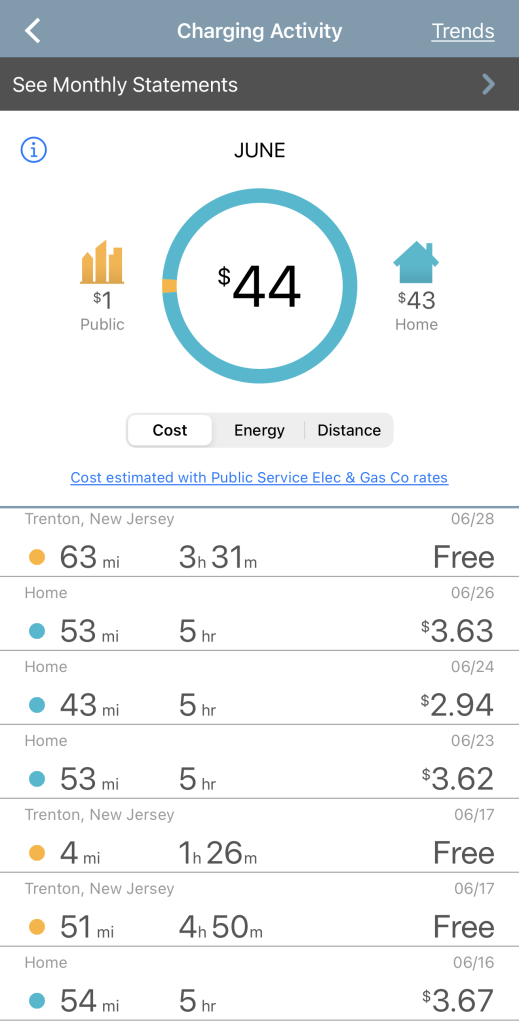 A quick look at his phone app shows the benefits Long is getting from his electric car, spending just $44 last month on electric energy rather than the hundreds many spend a month on gas. He says it takes just two days for someone to get comfortable and utilizing the interfaces electric cars have installed, such as the Google android system in the Polestar, which indicates arrival time and the charge you will need to get there. And there are a variety of charging options for these vehicles. Level 1, using a 120-volt household outlet, will likely take about 30 hours, while Level 2, alternating current (AC), decreases that to 4-6 hours and the improved direct current (DC) fast charging lowers that to around 30 minutes. The improved technology hopes to decrease or eliminate what’s called range anxiety, the fear of getting to/from your destination with enough charge – and something that prevents many from making the change.
A quick look at his phone app shows the benefits Long is getting from his electric car, spending just $44 last month on electric energy rather than the hundreds many spend a month on gas. He says it takes just two days for someone to get comfortable and utilizing the interfaces electric cars have installed, such as the Google android system in the Polestar, which indicates arrival time and the charge you will need to get there. And there are a variety of charging options for these vehicles. Level 1, using a 120-volt household outlet, will likely take about 30 hours, while Level 2, alternating current (AC), decreases that to 4-6 hours and the improved direct current (DC) fast charging lowers that to around 30 minutes. The improved technology hopes to decrease or eliminate what’s called range anxiety, the fear of getting to/from your destination with enough charge – and something that prevents many from making the change. The EQ is one of five models currently offered by Mercedes-Benz USA. These have been available for sale for around two years and already comprise approximately 10% of new vehicle sales at Mercedes-Benz of Princeton, also along Route 1 in Lawrenceville. The trend Greces is seeing of locals not giving up their gasoline-powered cars is one we’re hearing on the streets as well.
The EQ is one of five models currently offered by Mercedes-Benz USA. These have been available for sale for around two years and already comprise approximately 10% of new vehicle sales at Mercedes-Benz of Princeton, also along Route 1 in Lawrenceville. The trend Greces is seeing of locals not giving up their gasoline-powered cars is one we’re hearing on the streets as well. When it comes to public charging stations, Tesla has the most nationwide. However, all other EV brands are on a system that’s different than Tesla. While some can utilize certain Tesla stations through an adapter, overall use will soon be even easier. In 2025, Volvo and Polestar will be switching to Tesla’s charging infrastructure. As soon as next year, other brands, including Mercedes-Benz, are switching to Tesla charging, too, once connectors, plugs and payment systems are all adapted and integrated. The industry is hoping this will decrease the range anxiety and help people make the EV switch.
When it comes to public charging stations, Tesla has the most nationwide. However, all other EV brands are on a system that’s different than Tesla. While some can utilize certain Tesla stations through an adapter, overall use will soon be even easier. In 2025, Volvo and Polestar will be switching to Tesla’s charging infrastructure. As soon as next year, other brands, including Mercedes-Benz, are switching to Tesla charging, too, once connectors, plugs and payment systems are all adapted and integrated. The industry is hoping this will decrease the range anxiety and help people make the EV switch.
 Adults know that adulting can take a lot out of you. Being responsible and mature, working a fulltime job, paying your bills and keeping your home clean are necessary of course. But have you ever thought about how much happier you are when you also grant yourself time to enjoy life a little? July 8th was
Adults know that adulting can take a lot out of you. Being responsible and mature, working a fulltime job, paying your bills and keeping your home clean are necessary of course. But have you ever thought about how much happier you are when you also grant yourself time to enjoy life a little? July 8th was  Do you remember the first day you learned to ride a two-wheeler? Though many local roadways are working to make safe spaces to travel by bike, there are an abundance of bike paths to get you moving away from the traffic. The more than 70-miles of canal and trailways that make up
Do you remember the first day you learned to ride a two-wheeler? Though many local roadways are working to make safe spaces to travel by bike, there are an abundance of bike paths to get you moving away from the traffic. The more than 70-miles of canal and trailways that make up  As a kid you might have taken a local donkey for a walk, but now you have the opportunity to also walk an alpaca.
As a kid you might have taken a local donkey for a walk, but now you have the opportunity to also walk an alpaca.  Did you know that in 2020, sport climbing became part of the Summer Olympics? Clearly, the act of climbing builds intense strength, but a recent
Did you know that in 2020, sport climbing became part of the Summer Olympics? Clearly, the act of climbing builds intense strength, but a recent 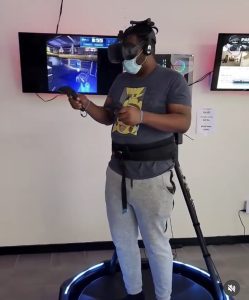 Virtual Reality (VR) systems can truly make you feel like you are climbing or rappelling somewhere similar to Ralph Stover or walking around in a feels-like-real setting of your favorite video game, all from a simple room. While enthusiasts may have their own systems at home, places like
Virtual Reality (VR) systems can truly make you feel like you are climbing or rappelling somewhere similar to Ralph Stover or walking around in a feels-like-real setting of your favorite video game, all from a simple room. While enthusiasts may have their own systems at home, places like  What is your go-to comfort food? We all have one, that meal that takes away some of our worries and just makes us feel at home. As expected, the top choices vary from state to state. An
What is your go-to comfort food? We all have one, that meal that takes away some of our worries and just makes us feel at home. As expected, the top choices vary from state to state. An  Lasagna is one of those meals that most people like, can be adapted to certain dietary needs and can sometimes last to fill a need for more than one meal. This year, there are 1,000 chefs cooking up lasagnas for neighbors across New Jersey. They are rarely professionals, but simply someone who is willing to bake up an extra meal in their kitchen and deliver it to someone going through a medical trauma, who is having trouble making ends meet, or who simply is too stressed out between work and home life. In Mercer County, 50 volunteer chefs are currently helping out, and so far, this year, around 300 meals have been delivered feeding 1,200 people.
Lasagna is one of those meals that most people like, can be adapted to certain dietary needs and can sometimes last to fill a need for more than one meal. This year, there are 1,000 chefs cooking up lasagnas for neighbors across New Jersey. They are rarely professionals, but simply someone who is willing to bake up an extra meal in their kitchen and deliver it to someone going through a medical trauma, who is having trouble making ends meet, or who simply is too stressed out between work and home life. In Mercer County, 50 volunteer chefs are currently helping out, and so far, this year, around 300 meals have been delivered feeding 1,200 people.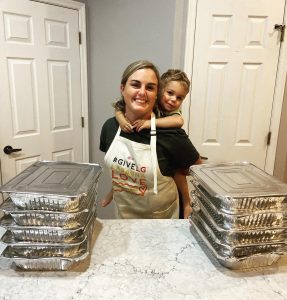 Since Menn began posting in 2020 on Facebook asking who needed help and offering up lasagnas, more than 350,000 hot meals have been delivered. Staying true to its roots, the organization mostly still utilizes the social media platform and its website to spread the word. So, if you want to
Since Menn began posting in 2020 on Facebook asking who needed help and offering up lasagnas, more than 350,000 hot meals have been delivered. Staying true to its roots, the organization mostly still utilizes the social media platform and its website to spread the word. So, if you want to 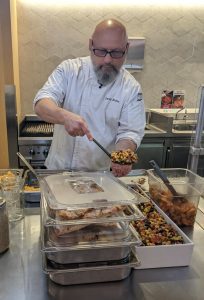
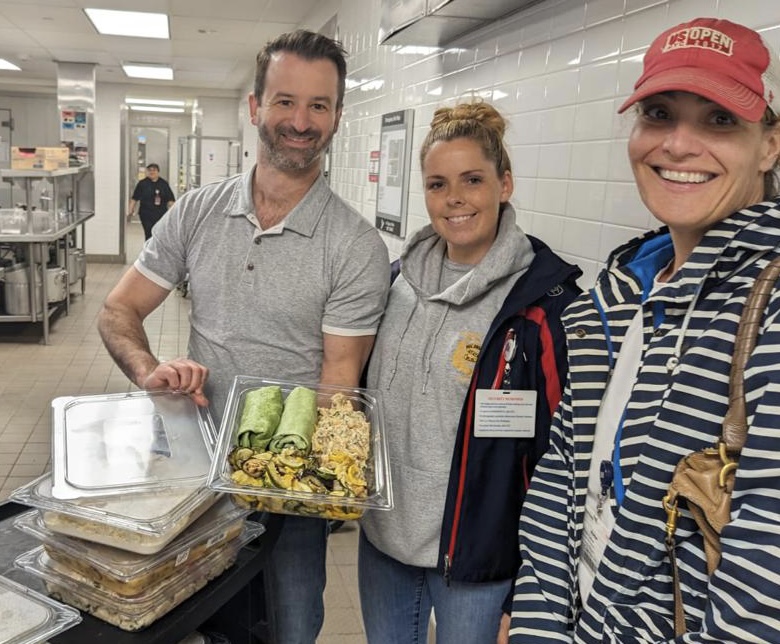
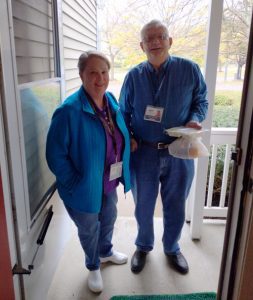 It is a sad reality that Lasagna Love and Share My Meals alone cannot meet the needs of the community. Decades before these organizations began, another was started to not only help older and homebound adults get the nourishment they need, but to also provide them with a little company.
It is a sad reality that Lasagna Love and Share My Meals alone cannot meet the needs of the community. Decades before these organizations began, another was started to not only help older and homebound adults get the nourishment they need, but to also provide them with a little company.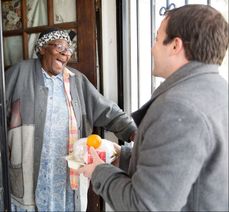 “We are also able to provide a second daily cold meal, as well as additional weekend meals on Fridays,” Englezos adds. “In addition, we provide fresh fruit and vegetables in the summer months, monthly deliveries of non-perishable food items so participants can have a ‘little extra’ in their homes, informational materials on relevant topics of interest such as proper nutrition, and monthly pet food bags tailored to the specific needs of their pets.”
“We are also able to provide a second daily cold meal, as well as additional weekend meals on Fridays,” Englezos adds. “In addition, we provide fresh fruit and vegetables in the summer months, monthly deliveries of non-perishable food items so participants can have a ‘little extra’ in their homes, informational materials on relevant topics of interest such as proper nutrition, and monthly pet food bags tailored to the specific needs of their pets.”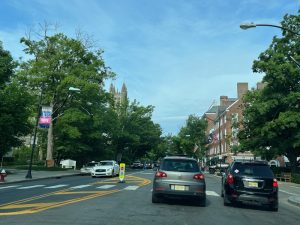 One of the things that attracts people to Princeton is its diversity. There are people of many races, nationalities, religions, socioeconomic levels and varying degrees of accomplishment. Princeton has long time residents, newcomers and people that are passing through. Some people drive, some ride bikes and others walk. In addition to residents, there are businesses, the municipality and visitors that may all have different interests. Quite often, there are bound to be a variety of opinions.
One of the things that attracts people to Princeton is its diversity. There are people of many races, nationalities, religions, socioeconomic levels and varying degrees of accomplishment. Princeton has long time residents, newcomers and people that are passing through. Some people drive, some ride bikes and others walk. In addition to residents, there are businesses, the municipality and visitors that may all have different interests. Quite often, there are bound to be a variety of opinions. If those words run have through your mind or come out of your mouth as you’re driving or trying to park somewhere around Princeton, you are not alone! Congestion, construction and parking difficulties seem to be commonplace while Princeton is trying to enhance itself in various ways. From the closures or construction along and nearby Witherspoon Street, to the demolition of the Tennent-Roberts-Whiteley buildings along Stockton Street, the creation of The Graduate Hotel on Chambers at Nassau Streets, Triumph Brewery construction in Palmer Square, PSE&G gas main replacements around town, apartment complex creations and Walgreens construction underway on either side of Princeton Shopping Center and down the road at the Thanet site, just to name some. Road crews, large machinery, necessary road closures and more are all being done with the hopes of creating better opportunities to live, shop and visit Princeton. But as they’re taking place, they are making many want to run for the hills!
If those words run have through your mind or come out of your mouth as you’re driving or trying to park somewhere around Princeton, you are not alone! Congestion, construction and parking difficulties seem to be commonplace while Princeton is trying to enhance itself in various ways. From the closures or construction along and nearby Witherspoon Street, to the demolition of the Tennent-Roberts-Whiteley buildings along Stockton Street, the creation of The Graduate Hotel on Chambers at Nassau Streets, Triumph Brewery construction in Palmer Square, PSE&G gas main replacements around town, apartment complex creations and Walgreens construction underway on either side of Princeton Shopping Center and down the road at the Thanet site, just to name some. Road crews, large machinery, necessary road closures and more are all being done with the hopes of creating better opportunities to live, shop and visit Princeton. But as they’re taking place, they are making many want to run for the hills! “All of this construction over the past 18 months was very underestimated,” shares Laurent Chapius, who owns and has operated
“All of this construction over the past 18 months was very underestimated,” shares Laurent Chapius, who owns and has operated  “Deanna [Stockton, Deputy Administrator/Municipal Engineer] and I were driving back from a meeting at the University one day. It was the day we authorized the
“Deanna [Stockton, Deputy Administrator/Municipal Engineer] and I were driving back from a meeting at the University one day. It was the day we authorized the  “They tell us, but not enough ahead of time to plan. We’re just doing what we do really well and hoping there’s an end. We’re not doing events [like Block Party] because those are impossible right now,” says Joanne Farrugia, co-owner of
“They tell us, but not enough ahead of time to plan. We’re just doing what we do really well and hoping there’s an end. We’re not doing events [like Block Party] because those are impossible right now,” says Joanne Farrugia, co-owner of  Walkability, beautification and the building of the Graduate Princeton and new
Walkability, beautification and the building of the Graduate Princeton and new  Dorothea von Moltke, co-owner of
Dorothea von Moltke, co-owner of  Phase 1 of the
Phase 1 of the  Beyond the shopping areas, locals are also encountering slowdowns driving in more residential areas. On trash day, traffic can be backed up for blocks. On the northeast side of town, multiple projects are creating disruptions such as the Walgreens construction at the Princeton Shopping Center along with new residential apartment complexes nearby and at the Thanet property. What will traffic be like once those bring in hundreds of new residents?
Beyond the shopping areas, locals are also encountering slowdowns driving in more residential areas. On trash day, traffic can be backed up for blocks. On the northeast side of town, multiple projects are creating disruptions such as the Walgreens construction at the Princeton Shopping Center along with new residential apartment complexes nearby and at the Thanet property. What will traffic be like once those bring in hundreds of new residents? If you are looking ahead for the calm, look with caution as years of new projects are already in the books. With 3 phases overall, the Witherspoon Street reconstruction down to Valley Road is not expected for completion until 2025.
If you are looking ahead for the calm, look with caution as years of new projects are already in the books. With 3 phases overall, the Witherspoon Street reconstruction down to Valley Road is not expected for completion until 2025. The Graduate hotel is expected to open in spring 2024, which would conclude any planned work on Chambers Street. And for the time being, Palmer Square Management says they have paused plans for the Griggs lot project (at Witherspoon and Hulfish). Building permits were never pulled and approvals for it have expired, though they expect to resume planning discussions for the space next year.
The Graduate hotel is expected to open in spring 2024, which would conclude any planned work on Chambers Street. And for the time being, Palmer Square Management says they have paused plans for the Griggs lot project (at Witherspoon and Hulfish). Building permits were never pulled and approvals for it have expired, though they expect to resume planning discussions for the space next year. In the meantime, if you want help to try to mitigate their impact and be informed of where and when projects are taking place, you can do the following:
In the meantime, if you want help to try to mitigate their impact and be informed of where and when projects are taking place, you can do the following: